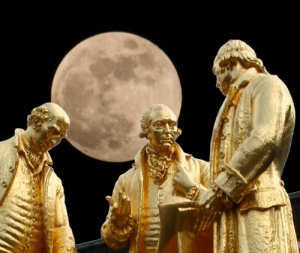Science before the twentieth century wasn’t done by “scientists.” There was no such word. There were educated amateurs and self-taught tinkerers, building their own labs in search of discovery or a patent. And so there wasn’t such a distinction between science and culture — the smart set went to “electrical parties” to see demonstrations of the newly discovered force. Ben Franklin wrote,
A turkey is to be killed for dinner by the electric shock, and roasted by the electric jack, before a fire kindled by the electrified bottle; when the healths of all the famous electricians of England, France, Holland, and Germany are to be drunk in electrified bumpers, under the discharge of guns from the electrified battery.
The best example of the public nature of science in Enlightenment England was the Lunar Society, a club of industrialists, natural philosophers, and intellectuals that met in Birmingham at the full moon between 1765 and 1813. The port and talk flowed. Joseph Priestley was a regular member: a self-taught chemist, political radical and Unitarian minister, he discovered oxygen and its necessity for animal life, invented seltzer water, and supported the American and French revolutions. Also a “Lunatick” was Josiah Wedgwood, the great ceramics industrialist and founding member of the Society for the Abolition of the Slave Trade. James Watt, the inventor of the modern steam engine, attended meetings regularly. Thomas Jefferson and Benjamin Franklin visited occasionally; Antoine Lavoisier corresponded with Society members; John Smeaton, the father of civil engineering, and Joseph Wright, the painter of the Industrial Revolution, were also regulars.
It must have been a thrill. Something like TEDTalks with Stilton. Writes Adam Hart-Davis:
The Lunar Society believed in argument and cooperation. They had long discussions about why thunder rumbles and decided the best way to test their various theories was by experiment. Boulton made a 5-foot-diameter balloon from varnished paper, and they filled it with a terrifying mixture of air and hydrogen (“inflammable air from iron”). They lit a fuse underneath, released the balloon into the night sky on a calm, clear evening and waited for the bang. Unfortunately, the fuse was rather long, and they all assumed it must have gone out; so they began to talk among themselves, when there was a colossal explosion, and they all said, “There it goes!” and forgot to listen for the rumble! Watt was at home 3 miles away and wrote that the bang was “instantaneous, and lasted about one second.” This seems self-contradictory, but in any case, the experiment failed to produce a simple answer to the original question.
There you have it: science, explosions, debate, optimism, politics, technology, curiosity. The future started more than two hundred years ago.
